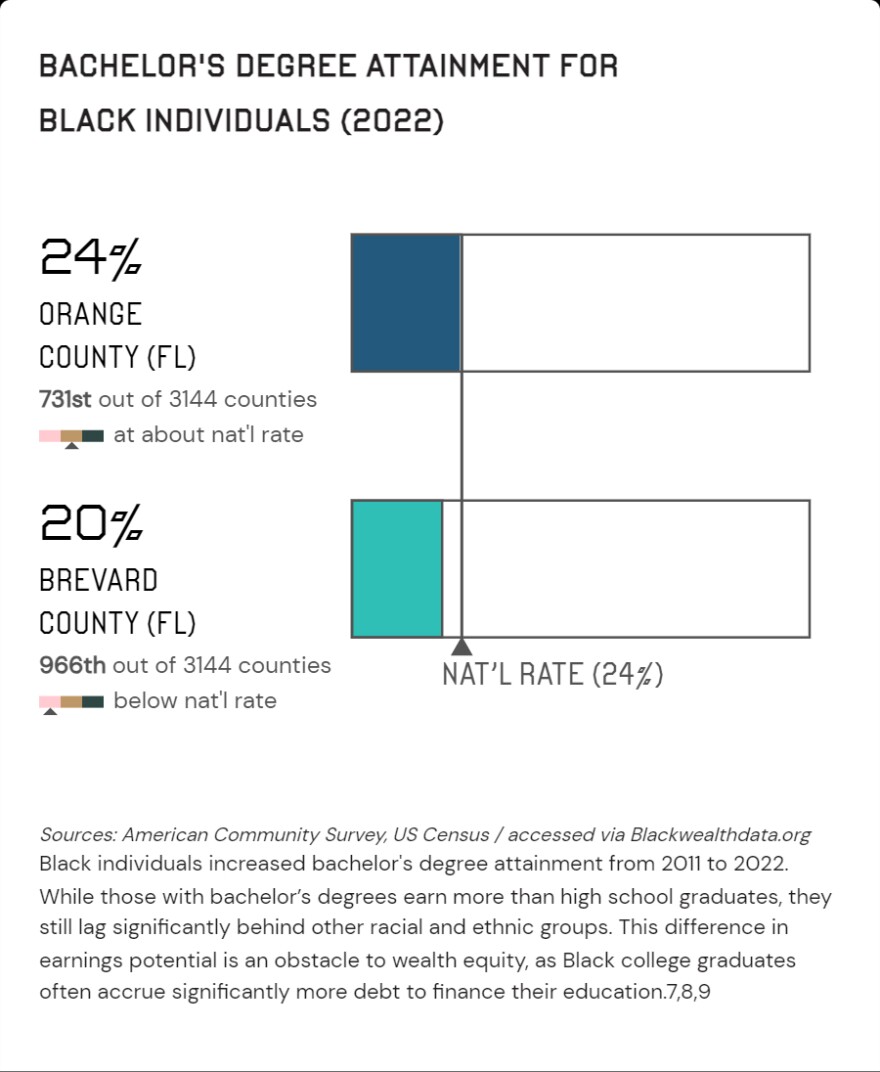What is the Black Wealth Data Center?
The Black Wealth Data Center was launched by Bloomberg Philanthropies’ Greenwood Initiative, with Prosperity Now serving as its host and incubator, according to its website.
Marisa Calderon, CEO and President of Prosperity Now, said the purpose of the Black Wealth Data Center is to serve as a place to “gather really publicly available intelligence with respect to wealth disparities specific to the black community.”
Calderon said organizations like Prosperity Now can then use that information to recommend policy and programmatic elements that can help improve circumstances to increase household wealth for the black community. “And in so doing, uplift other communities as well.”
The Black Wealth Indicators tool looks at county-level metrics to explore the state of Black wealth.
The Black Wealth Indicators include homeownership rates, median income, poverty, health insurance coverage, bachelor’s degree attainment, assets & debts, small business loans, broadband internet access, climate change, and banking.
How Central Florida counties compare
Harsha Mallajosyula, Data Director at the Black Wealth Data Center, said across Central Florida, there are indicators showing some counties are faring better than the national average when it comes to black wealth, but not all.
For example, the Black Wealth Data Center shows homeownership in Brevard County is above the national average 63%, but lags behind the national average when it comes to bachelor’s degree attainment.


Although homeownership attainment is higher in Brevard County compared to the national average, Marisa Calderon said that alone does not improve household wealth because of the historic impacts of redlining.
“The fact that property in communities that are primarily populated by the black community has been devalued historically over time, means that the opportunity to earn equity through that homeownership transaction is diminished. Especially so if you live in an area that has been impacted by historic redlining.”
Black wealth has increased in recent years across the country, but continues to lag behind other racial groups, according to the Brookings Institute.
Harsha Mallajosyula said there is no Central Florida county that is faring worse than the national average on all indicators of Black wealth. “But some counties are faring better than other counties.”
For example, bachelor’s degree attainment in Orange County is on pace with the national average, compared to Brevard County which is lagging behind 4 percentage points behind.

Orange County is also pacing above the national average for median income for Black households, but is still significantly lower than the median income for all households in the county.
The Florida Department of Health reports that the average median household income in Orange County is more than $72,000. While the Black Wealth Data Center reports that the average median income for Black households is only $55,000.
“When things like inflation begin to rise, when rents or the cost to purchase a home rise, that has a disproportionately adverse impact on populations with lower income. In this case, the black household income is a huge disparity. So that challenge is going to be more adverse,” said Calderon.
Along with homeownership, median income, and bachelor’s degree attainment, the Black Wealth Data Center also analyzes social vulnerability.
Social vulnerability measures the likelihood a community faces negative consequences from environmental, economic, or health-related disasters.
Harsha Mallajosyula said many Central Florida counties have a high social vulnerability index.
“This is really important data that we're making accessible to policymakers, because infrastructure challenges in the face of climate change is something that communities need to grapple with.”
To see how your county compares to the national average and other Florida counties when it comes to Black Wealth Indicators, click here.
Needed changes
There have been marginal improvements in Black Wealth, but Marisa Calderon said overall it’s not really improving.
She said that means there are structural things that need to change or the problem will continue.
“For as long as this data has been tracked, this has been true. There needs to be really a strategic intervention that addresses the structural inequities in order for there to be real improvement.”
One way Prosperity Now is looking to enact that change involves Baby Bonds.
“That will allow for every child to have a deposit that begins at the time that they join us in this world. From there forward, really, that having that starting point of an investment in them in their future, helps to begin that asset building.”
But, Baby Bonds alone won’t fix the disparity in Black Wealth.
Calderon said there is no “silver bullet.”
“The biggest thing in general is political will to be able to address the things that we know are issues. We know what the structural impediments are, and what we need is collective political will to be able to do what needs to be done so that all of us have equal access to a self determined future.”
A study by Citigroup in 2020, estimates that the U.S. economy lost out on as much as $16 trillion due to racial wealth inequities.





